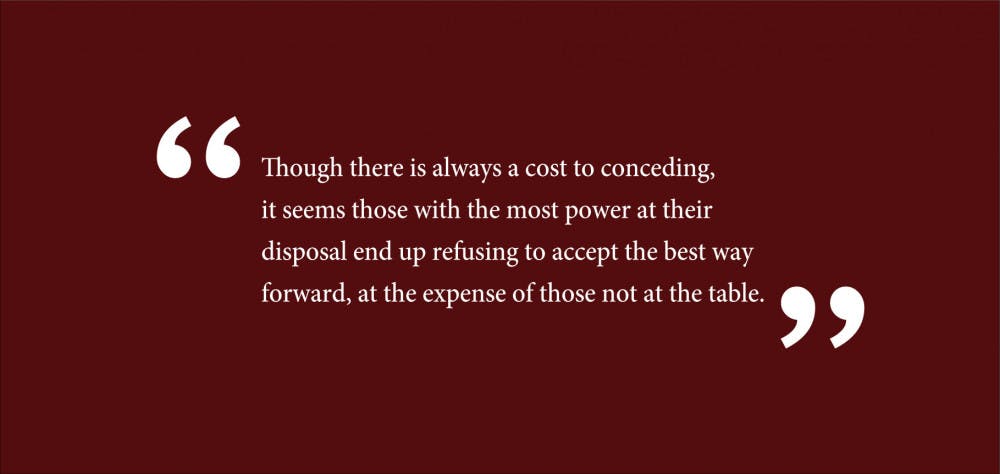You can’t always get what you want. And neither can Amazon nor the President of the United States. Stuck at the crossroads of politics, policy and hubris, one of the world’s most valuable companies, Amazon, and one of world’s most powerful people, President Trump, failed in their respective quests for their coveted grails. Amazon’s plan for a second headquarters in New York, an easy economic boon for the city and state, sparked activist and political resistance that caught Amazon by surprise, despite the Cuomo-de Blasio $3 billion red carpet rollout of corporate incentives. The president’s infamously venerated wall — turned see-through steel slats turned fencing turned “whatever you want to call it” border installation — was soundly rejected by Congress, which threw Trump a fractional $1.37 billion bone for physical barriers as a consolation prize. When Amazon and Trump faced moments of pushback, they both retreated to unilateral defiance. Instead of making the most of these situations, each behemoth left the table while smashing something on the way out. These recent events once again raise the question among pundits and observers if the art of the compromise is dead. I argue no. Since compromise is achievable, it is clear that neither Amazon nor the president used the available tools at their disposal to reach such a compromise. The result is a range of consequences — from frustrated dissatisfaction to clearly negative outcomes.
Amazon’s hasty New York departure under the slightest bit of scrutiny reflects the company’s haughty outlook and lack of policy expertise. In the same vein as its founder Jeff Bezos, Amazon has attempted to craft a low profile while unintentionally forging an untouchable, ivory tower aesthetic. In a do-it-alone approach, the company has historically avoided interaction with local government and communities where its physical presence looms large. Take its home base in Seattle, where the company and its executives have had little engagement with municipal policymakers for almost twenty years. Yet last year, a tax proposal on large employers unexpectedly prompted Amazon to threaten to stop its growth in the city. This episode serves as a clear prologue to its actions in New York. Despite the mayor and governor bending over backwards to solicit Amazon, the company’s lack of political due diligence and stakeholder assessment of interest groups and communities impacted by an HQ2 presence combusted a surefire deal into flames. Civic engagement is a two-way street, as is compromise. It takes hard work to win over skeptics and build on-the-ground relationships to advance solutions that have the potential to be mutually beneficial. Rather than get down in the mud, Amazon prefers to operate in the clouds above the reality of our pluralist society: Everyone has a voice to be reckoned with, not just the institutionally powerful.
The president’s dubious constitutional national emergency declaration can also be seen as a response from an arrogant power player unequipped with the temperament and policy tools to make a deal. With his “I alone can fix it” mantra and disdain for anything requiring an iota of expertise or fact, the president routinely handicaps himself in policy decisions and political strategy. Beyond considerations across the aisle, the president holds a weak position within his own party. After routinely failing to secure border funding under a Republican-held Congress, the madman in the White House triggered the longest government shutdown in U.S. history, torpedoing any deal or compromise for over 35 days that inflicted over billions of dollars lost to the economy and left hundreds of thousands of workers furloughed. His disregard for honest engagement and his political naiveté often leave him cornered and outmaneuvered as a victim of his own ineptitude. If only Trump’s book, “The Art of the Deal,” included a chapter on coalition building or policymaking 101. Last week, bipartisanship won out when legislators tuned out the White House and found common ground on the border security impasse. Rather than choosing to seize an opportunity of stakeholder consensus building to implement the new security policies, he launched another incendiary salvo. Very presidential.
When compromise fails, there are externalities that spillover beyond the involved parties. The collateral damages in the wake of these particular outcomes are local citizens and our systemic norms. Beyond the unrealized 25,000 new jobs, new investments in Queens and tax revenue, Amazon’s pullout — despite some locals and activists hailing the decision — may cause other companies to view New York as hostile toward new business, ultimately hurting local residents. The president’s attempt at seizing funding throws the legislative branch’s sacrosanct control of the federal purse into question. Similarly, the nature of the fabricated border wall emergency brushes aside presidential precedent and is an example of a gross abuse of executive power.
At the end of the day, getting a player to the negotiating table may be harder than actually reaching the point of compromise. Though there is always a cost to conceding, it seems those with the most power at their disposal end up refusing to accept the best way forward, at the expense of those not at the table. It’s easy to blow things up, but hard work and the right tools build solutions. Maybe if actors like Amazon or the president tried it some time, they may get what they need.
Reid Secondo ’16 GS can be reached at reid_secondo@brown.edu. Please send responses to this opinion to letters@browndailyherald.com and op-eds to opinions@browndailyherald.com.





